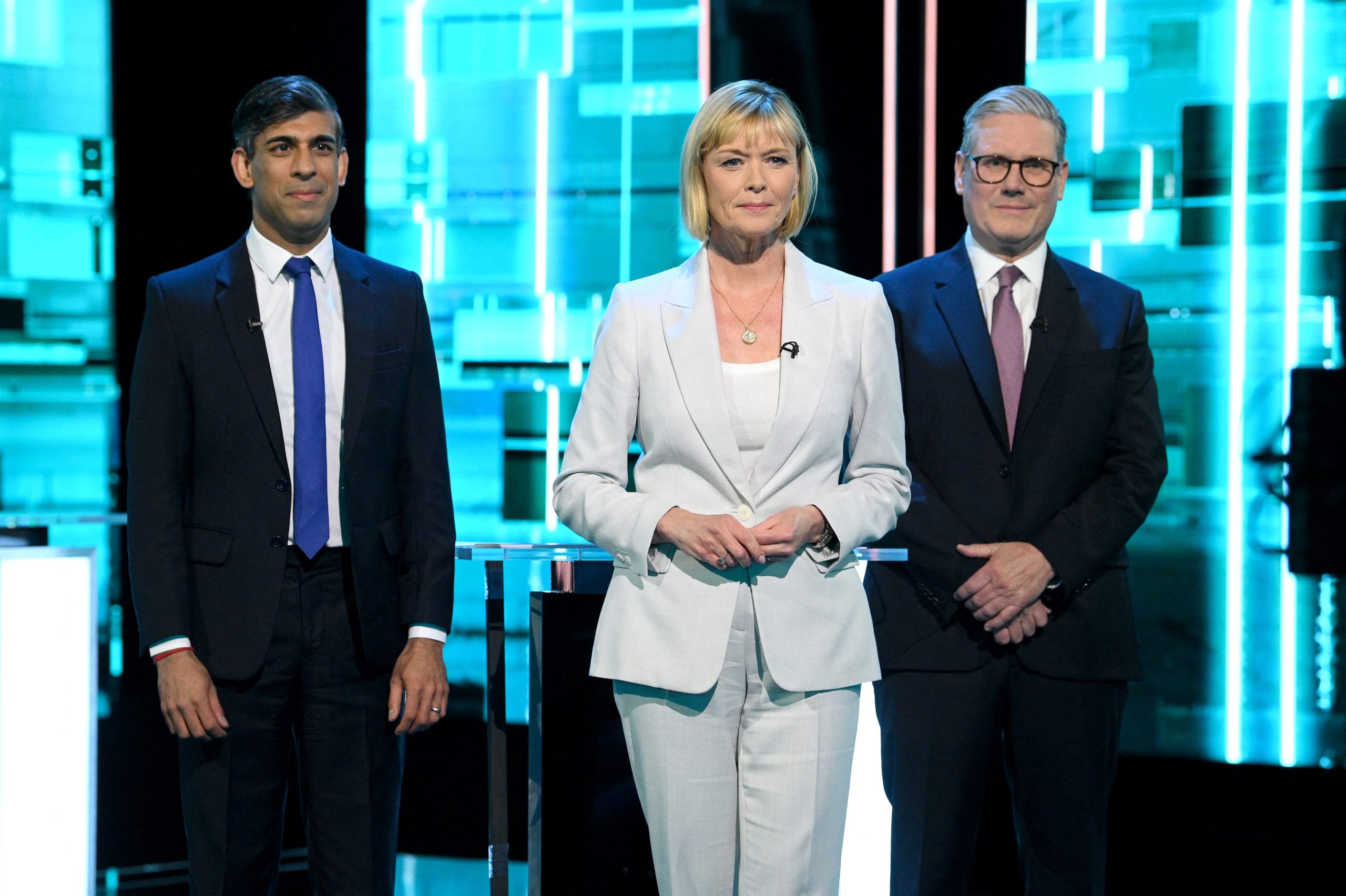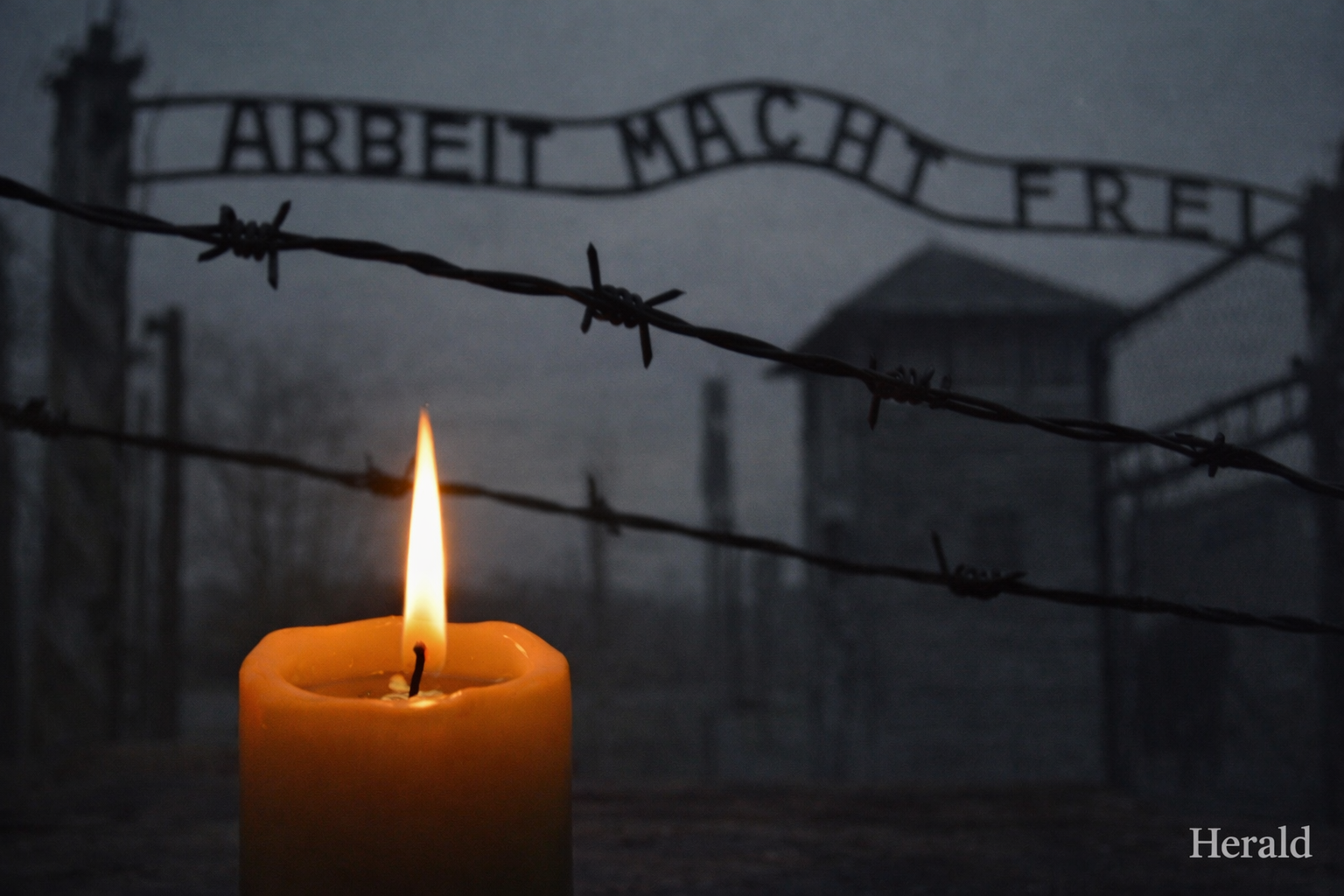Comment
Dismal debate shows leaders’ shortcomings

THIS reporter watched the first debate of the General Election campaign, writes Jon Coles.
He did it to spare you the bother.
He wishes he hadn’t spared you because now he’s bothered.
There are several ways to approach reporting on such an event: a stringent analysis of the facts, a comparison of the policy pledges both leaders made, and even bemused indifference.
Instead, here’s a balanced and informed personal response.
If that’s the choice the country faces, we are all doomed.
On the one hand, tiny, tetchy, and oh-so-shouty Rishi, who couldn’t bring himself to acknowledge his party has been in power for fourteen years.
On the other hand, Keir Starmer couldn’t help but remind people that he came from humble oranges and believed in something, even if he couldn’t identify it under questioning.
In the middle, Kate Etchingham from ITV News needed to be subbed out in favour of Nigel Owen as soon as she let Rishi Sunak repeat the same lie repeatedly without allowing Keir Starmer to address it.
Mr Sunak’s message was simple: “WOOOOOO! Labour! Spooky! Beware!”
Mr Starmer’s was also simple: “My dad was a toolmaker.”
If that is the best the two largest political parties in the UK can come up with, you have to wonder how bad their own parties’ alternatives are.
(This reporter also watched the Senedd this week; he knows).
You don’t have to wonder hard, of course. Liz Truss, Boris Johnson, Jeremy Corbyn, and the Steve Miller Band have all had a go and all been disastrous.
In the interest of introducing some facts into fact-free exchanges, The Herald looked at the big claims both made.
Mr Sunak argued for a £2000 tax rise under Labour. Here’s how he came up with that number: his policy advisors created a list of “Labour policies”, made assumptions about them, and then asked Treasury civil servants to cost them.
In short, the Prime Minister’s figures are garbage, and he knows they are.
Mr Sunak also said a Labour government would tax people’s pensions. Since he, as Chancellor, pulled hundreds of thousands of pensioners into paying taxes by freezing tax thresholds only to pledge an unaffordable pension “quadruple lock” after fourteen years in office, his words ring hollow.
Onto Sir Keir Starmer.
Did he mention his father was a toolmaker?
More seriously, it’s hard to think of a single thing Keir Starmer said that amounted to a policy that would improve people’s lives. He was sad for the lady with cancer. He sympathised with the student. He would be firm but fair.
In other news, the sky is blue, the grass is green, and the rain is wet.
Messrs Sunak and Starmer profess to be big football fans. The debate was like watching a dismal mid-table fixture between two teams, unaware that the important thing to do with the ball is kick it towards the other side’s net in the hope of scoring a goal.
Mr Sunak wanted to concentrate on the future. That’s not a surprise. His biggest achievement is staying in office long enough to undo the worst economic effects of his predecessors’ administrations.
You would never associate Mr Sunak with chutzpah. However, for sheer nerve, accusing Mr Starmer of not coming up with a better idea in fourteen years than his brilliant one for National Service was like a child who’d murdered their parents asking a court for mercy because they’re an orphan.
It would be churlish to point out his own Armed Forces Minister ruled out National Service only two days after Mr Sunak called the election because the armed forces didn’t want it.
Mr Sunak’s claim that, on the contrary, many in the armed services supported the scheme means either his minister was wrong and those briefing him from the armed services were wrong, or – and it’s a possibility – one of his friends on Call of Duty said it was a vote winner.
Back to Keir Starmer.
Did you know his dad was a toolmaker?
The studio audience liked Sir Keir’s pledge to crack down on those using non-domiciled tax status to avoid paying taxes. He could’ve rubbed it in by saying that since Mr Sunak’s campaign team had identified £2.5bn in tax avoidance that could be recovered quickly after fourteen years of looking for it, he might be persuaded to let the sons-in-law of Indian billionaires off the hook.
However, apart from non-dom status, the only thing approaching a firm policy commitment from the Labour leader was his observation that his dad was a toolmaker.
That’s a dreadful verbal tic, and he will have to do more than swap it out for “my mum was a nurse”.
Spiky exchanges on immigration were as heated as they were unenlightening.
When discussing migration, Mr Sunak claimed small boat arrivals are down by “a third” in the last 12 months.
Small boat arrivals did fall by around a third in 2023, comparing year-on-year. However, provisional figures show that in 2024, small boat arrivals have risen 38% compared to the same period last year.
Mr Sunak had a nice line prepared for Keir Starmer’s predictable attack on going to the country before a single plane took off for Rwanda. On the one hand, Mr Starmer had spent two years calling for an election, only to complain when one was called.
The Labour comms team must work on that.
However, the Labour leader was surely correct when he said only international cooperation would stop the organised gangs involved in people trafficking. Glorious isolation will achieve nothing and probably – as those who backed Brexit to curb immigration have found out – make things far worse.
As for who “won”?
The Labour leader shaded it by being less obnoxious.
We must also remember that those commenting online or offering an opinion on broadcast media had made up their minds before Keir Starmer or Rishi Sunak opened their mouths.
It’s always best to watch for yourself and make up your mind.
In this case, don’t bother.
Summing up the debate is easy: seventy minutes wasted.
Comment
Holocaust Memorial Day: The gas chambers didn’t just appear

Opinion piece by Herald editor Tom Sinclair
TODAY is Holocaust Memorial Day, January 27, 2026. Across Wales we remember the six million Jews murdered by the Nazis, and the Roma, disabled people, gay men and women, political opponents, and many others the regime labelled undesirable. We light candles, say “never again”, and tell ourselves that kind of evil is locked in the past.
But if remembrance ends at the gates of Auschwitz, we miss the real lesson.
The Holocaust did not begin with gas chambers or cattle trucks. It began in ordinary places, shops, streets, pubs, council chambers, with words that stripped people of their humanity, laws that pushed them to the margins, and propaganda that turned neighbour against neighbour. It began when ordinary people started seeing others as problems, as threats, as not really belonging.
It began with politicians pointing fingers at who to blame.
With newspapers branded enemies of the people.
With courts and rules quietly bent.
With minorities held responsible for hard times.
With cruelty sold as common sense.
And above all, it began with silence.
Last week in Milford Haven, I saw that silence in action.
A shopkeeper, someone who came here from another country, set up a business, pays his way and serves the town, was racially abused inside his own shop. He tried to stop a man walking out with unpaid beer. For doing his job, he was told to “go back home”, told he was not welcome. The thief responded by sweeping stock off the shelves and smashing it onto the floor.
I asked why he did not ring the police. His answer came straight away. “What’s the point? They won’t do anything. It’ll just happen again tomorrow.”
That exchange stuck with me. Not because it was uniquely shocking, but because it felt horribly familiar. No new laws. No uniforms. No symbols. Just raw contempt, casual racism, and the shared understanding that nothing would come of it. A man contributing to the community was made to feel like an outsider in his own workplace, and he had already lost faith that anyone would step in to protect him.
This is how it starts. Abuse becomes normal. Victims stop reporting because experience has taught them the system will not respond. Prejudice is dismissed as “just words” or “banter”. Indifference takes hold.
We are often told not to make comparisons, not to be alarmist, not to link today with that past. Fair enough. History does not repeat itself in neat patterns. But it does move in stages, and the most dangerous stage is the one people fail to notice. The slow normalisation of division, cruelty and disregard.
In towns like Milford Haven, Haverfordwest and Pembroke Dock, places built on hard work and looking out for one another, we know what community means. We have weathered closures, recessions and hardship together. We do not turn away when one of our own is targeted.
Yet when a shopkeeper loses faith that the police or the public will stand with him, something vital erodes. When hate goes unchecked, the ground is quietly prepared for worse.
Holocaust Memorial Day is not about guilt. It is about vigilance. It asks the hardest question of all. Not what monsters once did, but what ordinary people allowed by doing nothing.
The worst crimes in history were not announced in advance. They were built quietly, policy by policy, lie by lie, while too many looked the other way.
That is why we still remember today. And why, in our Welsh towns, remembering must mean refusing silence.
If you see it, say something. If you hear it, challenge it. If someone is targeted, stand with them. Because “never again” only holds if we make it hold, here and now, in the places we live.
Comment
When the System Decides: AI, authority and the quiet loss of human judgment

OPINION: BY PAUL DOWSON
ARTIFICIAL INTELLIGENCE is no longer a future technology. It is not waiting for legislation, ethical consensus, or public debate. It is already here, embedded in systems that exercise immense power.
AI is in our warplane cockpits.
That single fact should change the entire conversation. This is not about chatbots or convenience. It is about authority: who holds it, who hides behind it, and who is left accountable when things go wrong.
In modern military aircraft, AI systems assist with navigation, threat detection, targeting support, and reaction timing. They operate at speeds no human can match. The case for their use is compelling. Machines do not panic, tire, or hesitate. In combat environments, hesitation costs lives.
So why should we be concerned?
Because the real risk of AI is not that it will suddenly develop malicious intent. That idea belongs to science fiction and distracts us from a far more ordinary, and far more dangerous, reality. AI is increasingly treated as neutral.
Neutral systems are trusted. Trusted systems stop being questioned. And what is no longer questioned quietly becomes authority.
We already live under layers of process. Decisions are routinely explained away with phrases like “policy”, “procedure”, or “the system”. AI is the most powerful extension of this trend yet. It produces outcomes while making it harder to say who actually decided.
In civilian life, this is already happening in areas such as welfare and public services. Eligibility decisions are increasingly shaped by automated scoring systems. Someone can be denied support, flagged for investigation, or pushed down a queue not because a person made a judgment, but because “the system says” they do not qualify. The outcome feels final, yet the assumptions embedded in the model are rarely visible, and almost never open to meaningful challenge.
When responsibility is pushed into a system, accountability evaporates. No one “decided”. The model ran. The process was followed.
I have seen first-hand how “objective” systems can be steered toward particular outcomes without anything that looks like corruption. It does not require conspiracies or secret meetings. It happens through design: what data is used, what is left out, how success is defined, how risk is weighted.
To the public, the result looks inevitable.
To those who understand the system, it is engineered.
AI magnifies this effect dramatically. Once systems become complex enough, very few people can meaningfully challenge them. “The model says” becomes the end of the conversation. Questioning outcomes starts to sound like ignorance rather than scrutiny.
Supporters of AI are right: automation has already saved lives. Aircraft are safer today precisely because computers assist, and sometimes override, human pilots. In dangerous environments, AI can see more, calculate faster, and respond sooner than any person ever could.
Refusing to use such tools would be irresponsible.
That argument deserves to be taken seriously. But it still misses the deeper issue.
What starts as assistance becomes reliance.
Reliance becomes deference.
And deference becomes authority.
Over time, humans stop deciding and start supervising. The human becomes the back-up. Judgment becomes confirmation. The key question quietly shifts from “Is this the right decision?” to “Is there any reason to override the system?”
That shift matters. Because once humans are no longer the primary decision-makers, responsibility becomes a formality rather than a reality.
We are told AI can be audited. In theory, yes. In practice, real scrutiny requires expertise, access, and the power to challenge outcomes. Most people, including many decision-makers, do not have these. For them, the system’s output is effectively unquestionable.
And systems are never neutral. They reflect priorities: military objectives, political pressures, funding decisions, strategic advantage. AI does not remove human values from decisions. It buries them beneath complexity.
What is happening in military aviation will not remain confined there. The same logic is already spreading into finance, policing, welfare systems, hiring decisions, and border control. Everywhere AI is positioned as an objective arbiter, responsibility becomes harder to locate and harder to contest.
The greatest danger is not that machines will decide badly. It is that humans will lose the habit, and the authority, of deciding at all.
I support AI. Its potential is extraordinary. Used properly, it can enhance human judgment, reduce error, and save lives. But if we fail to shape how it is deployed, we risk building systems that do not supplement us, but quietly replace us.
AI does not need consciousness to reshape power.
It only needs our trust.
And trust, once handed over, is rarely reclaimed.
Author bio

Paul Dowson is a former independent county councillor in Pembrokeshire (2017–2022) and has spent his career in business management and communications. He supports the adoption of artificial intelligence where it strengthens human decision-making, but argues it must never become a substitute for accountability or judgment.
Comment
Should the King cancel the US state visit in April? Yes — and he should say why

OPINION – BY TOM SINCLAIR, EDITOR
THE KING is not a politician. He is, however, the Commander-in-Chief of the British Armed Forces. That distinction matters, because it draws a line between everyday diplomacy and something more fundamental: respect for service, sacrifice, and the people this country asks to stand in harm’s way.
On that basis, the scheduled state visit to the United States in April should not go ahead as planned. It should be postponed indefinitely — and the reason should be made clear, quietly but firmly: Britain will not wrap ceremonial honour around rhetoric that demeans those who serve.
That is the crux of it. The issue is not a petty spat, a bruised ego, or an argument about “who said what” on social media. It is the principle of how allies speak about allied forces — and whether the United Kingdom is prepared to smile, toast and wave through remarks that, in the eyes of many serving personnel, veterans, and military families, amount to a straight insult.
You can hear it in the public reaction. People who would rarely write to a King or comment on foreign policy are suddenly saying the same thing in plain language: if the Head of the Armed Forces carries on regardless, it feels like a slap in the face to those who “stood the line” — and to the families of those who did not come home. Some are calling for a postponement “until there is an apology”. Others say: don’t postpone — cancel. Underneath the anger, there is a consistent instinct: dignity matters, and so does loyalty.
Now add the awkward history. Not so long ago, Donald Trump received the full ceremonial treatment in Britain. A banquet. The gold-trimmed theatre of state. All presented as diplomatic necessity, above politics, in the national interest.
Did it work? Did it moderate language, build respect, reduce volatility, improve conduct? If anything, it taught the opposite lesson: that Britain will keep offering prestige even when it gains nothing in return. The Crown’s soft power was put on display, and the recipient treated it like another trophy.
That is why doing it again now would be worse than a mistake. It would be a pattern.
Supporters of the trip will reach for the familiar argument: Britain’s relationship is with the United States, not with one individual. And that is correct. Defence, intelligence, trade and security cooperation are too important to be thrown around as gestures.
But a state visit is not the machinery of government. It is the highest honour we can confer. It is symbolism in its most potent form. It is an embrace.
And there is a difference between continuing diplomacy and offering ceremony.
Britain can and should continue the serious work through ministers, ambassadors, defence chiefs and officials. That work is robust enough to survive a postponement of pageantry. What it cannot survive — at least not without cost — is the impression that the country’s top symbol of service is prepared to overlook contempt directed at service.
There is also a constitutional realism that needs saying out loud. The King does not freelance. He acts on ministerial advice. That means the responsibility for this does not sit with one man in one palace. It sits with the government of the day. If the visit goes ahead, it will not be interpreted internationally as a “neutral royal engagement”. It will be interpreted as a British national choice.
Which raises a simple question: why would Britain choose, voluntarily, to place its Commander-in-Chief into the middle of America’s partisan furnace — where every handshake becomes a headline and every photograph becomes a message?
The monarchy’s strength is that it is not supposed to take sides. Yet the more polarised the environment, the harder neutrality is to maintain. A state visit in April risks being treated as an endorsement by one camp and a provocation by the other. That is not only unfair to the King; it is dangerous for the institution. No head of state should be used as a campaign prop, least of all one whose constitutional role depends on being above the fight.
So what should happen?
The government should advise postponement on grounds that are unarguable and non-partisan: respect for allied forces and the need to keep the Crown out of domestic political controversy abroad. The Palace should keep the language measured: a desire to reschedule at a more appropriate time, in a way that reflects the enduring UK-US relationship and the importance of mutual respect between allies.
And if there is to be a condition for reinstating the visit, it should be simple: a clear, public reaffirmation of respect for NATO service personnel and the sacrifices made by military families. Not a grovelling performance. Not a media circus. Just a statement of basic decency that any ally should be able to make without choking on it.
Some will say Trump never apologises. That may be true. But the point is not to choreograph an apology. The point is to stop granting honours as if they are automatic.
Because Britain has already tried the “butter him up and hope for the best” approach. We’ve seen the banquet. We’ve watched the pageantry. We’ve heard the rhetoric continue.
At some stage, a grown-up country has to decide what it will and won’t dignify.
If the King is the head of our armed forces in name, then he must be the head of our armed forces in meaning too. That means he cannot be asked to raise a glass to a man whose words have demeaned the very people the Crown is meant to honour.
Postpone the state visit. Keep the diplomacy. Protect the institution. And, above all, stand by the men and women who stood for us.
-

 Health4 days ago
Health4 days agoConsultation reveals lack of public trust in health board
-

 News5 days ago
News5 days agoCaldey still unsafe, survivors warn — despite Abbey’s reform claims
-

 Community5 days ago
Community5 days agoPembrokeshire students speak at national Holocaust Memorial Day event
-

 Local Government7 days ago
Local Government7 days agoTribunal over former Neyland councillor’s conduct adjourned
-

 News5 days ago
News5 days agoKurtz raises Gumfreston flooding in the Senedd as petition deadline nears
-

 Community4 days ago
Community4 days agoCampaign to ‘save’ River Cleddau hits over 2,200 signatures
-

 Community6 days ago
Community6 days agoStorm Chandra: Morning impacts across Pembrokeshire
-

 Entertainment6 days ago
Entertainment6 days agoRapunzel brings festive magic to Torch Theatre


























